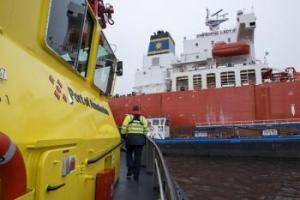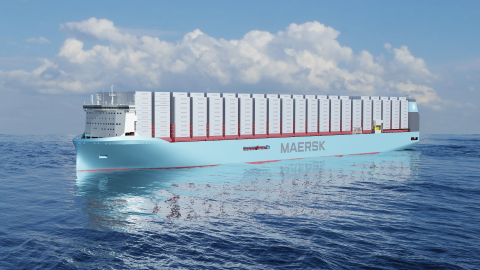Harbour Master
Harbour Masters
Worldwide there are approximately 3,000 merchant ports and the work of the Harbour Master can vary widely from country to country and from port to port even within the same country.


On 5 October it was announced from Copenhagen by A P Møller – Maersk (Maersk) that it has ordered a further six large ocean-going vessels that can sail on green methanol.
It is understood that the six vessels will be built by Hyundai Heavy Industries (HHI) and have a nominal capacity of approximately 17,000 TEU. These new vessels will replace existing capacity in the Maersk fleet.
To quote Henriette Hallberg Thygesen, CEO of Fleet & Strategic Brands at Maersk: ‘Our customers are looking to us to decarbonise their supply chains, and these six vessels able to operate on green methanol will further accelerate the efforts to offer our customers climate neutral transport.
‘Global action is needed in this decade in order to meet the Paris Agreement’s goal of limiting global warming to a 1.5°C temperature rise.’
Maersk has set a net-zero emissions target for 2040 across the entire business and has also set tangible near-term targets for 2030 to ensure significant progress.
This includes a 50% reduction in emissions per transported container in the Maersk Ocean fleet compared to 2020 and a principle of only ordering newbuilt vessels that can be operated on green fuels.
Nineteen green methanol vessels on order
With the order, Maersk has in total order of 19 vessels with dual-fuel engines able to operate on green methanol.
Palle Laursen, Chief Fleet & Technical Officer at Maersk reflected: ‘Green methanol is the best scalable green fuel solution for this decade, and we are excited to see several other shipowners choosing this path. It adds further momentum to the rapid scaling of availability needed to bring down the premium on green methanol and accelerate the evolution of climate neutral shipping.’
Benchmarked against conventional fuel capabilities, additional capital expenditure (CAPEX) for the methanol dual-fuel capability is in the range of 8-12%, which is an improvement compared to when Maersk ordered eight vessels with the same technology last year, it has been reported.
The six 17,000 TEU vessels are all to be delivered in 2025 and will sail under the flag of Denmark. They all come as part of Maersk’s ongoing fleet renewal programme and their capacity will replace an equal amount of capacity reaching end-of-life and leaving the Maersk managed fleet. When all 19 vessels on order are deployed and have replaced older vessels, they will generate annual CO2 emissions savings of around 2.3 million tonnes.
Maersk further reiterates its strategy of maintaining a fleet capacity at a maximum of 4.3 million TEU, as a combination of Maersk managed and time-chartered vessels.
The six vessels ordered will come with dual-fuel engines able to operate on green methanol and will save about 800,000 tonnes of CO2 emissions annually.
Picture credit
A P Moller – Maersk©
Founded in 2017, MarineLabs delivers high-resolution, real-time, and historical wind, wave, and weather data, as well as hyper-local 10-day forecasting, from a growing network of cloud-connected, rugged sensor nodes.
The International Harbour Masters Association (IHMA) and the Port of Rotterdam Authority are pleased to announce the 15th International Harbour Masters Association Congress, to be held from 09–12 June 2026 at Theater Zuidplein in Rotterdam.